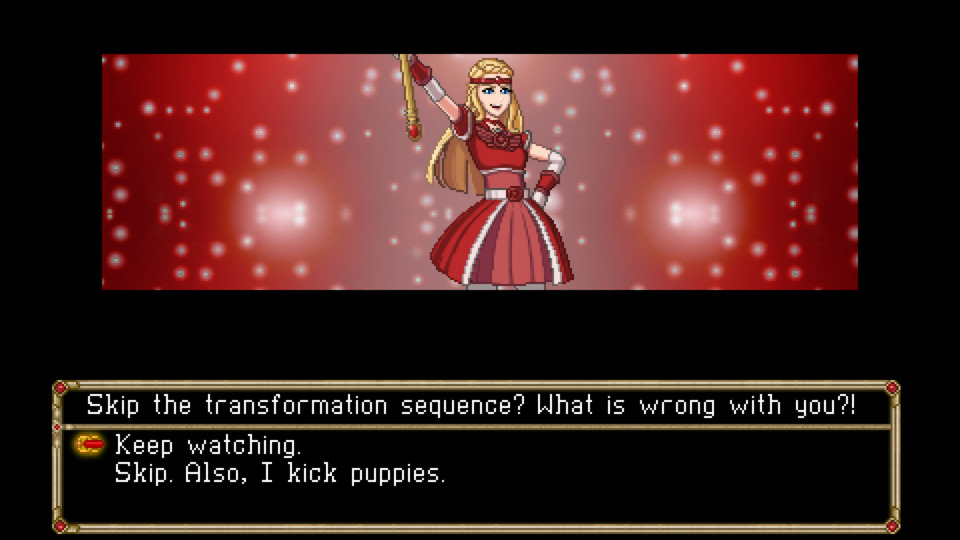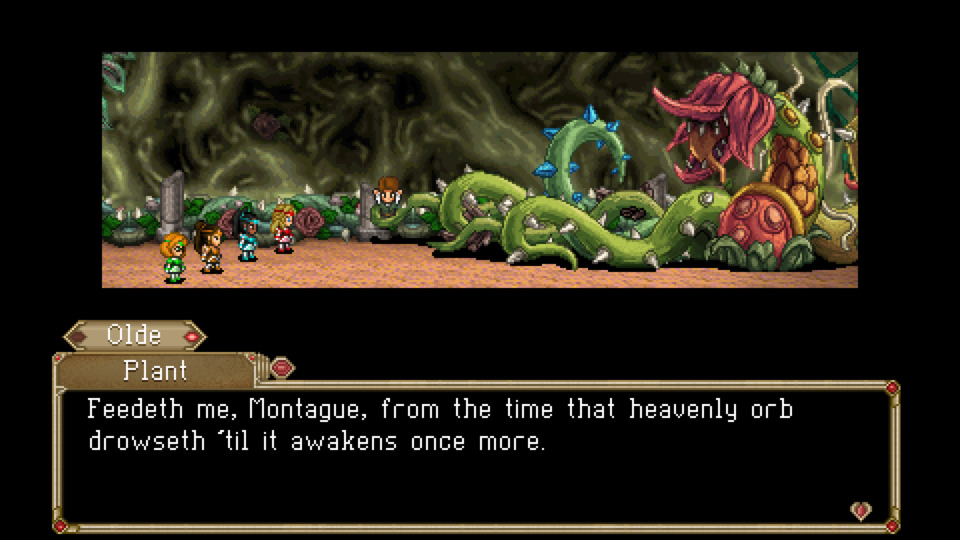Indie Game of the Week 361: This Way Madness Lies
By Mento 0 Comments

Man, it's good to be back with another Zeboyd joint. Last time I took on one of their delightfully compact JRPG throwbacks was way back in 2017 with Cosmic Star Heroine (IGotW #32)—an uncharacteristically current IGotW subject at the time—and I keep missing Cthulhu Saves Christmas whenever it goes on sale (oh wait, it's on sale right now. £2? Sold!) so here we are some scant seven years later with a new IP of theirs. This Way Madness Lies, a line taken from Shakespeare's King Lear, is a magical girl anime combined with the Bard's less celebrated plays. Not the historical ones, just the ones that tend to get fewer movie adaptations. A group of highschool girls named for Shakespearean heroines have an after-school part-time job of sorts where they transport to the worlds of Shakespeare's plays and clear them of extradimensional horrors that did not feature in the original texts, tying the game in nominally with the developer's previous Cthulhu games. Between these missions, they hang out as a group and sometimes put together Shakespeare performances as part of their school's drama club; these hangout sequences serve as breathers and sort of resemble the downtime of the Persona games, where you might still find yourself embroiled in an unexpected battle or two or be forced to answer trivia questions from teachers (that you can just look up on the internet; the characters even suggest you do so if you get one wrong).
This Way Madness Lies displays the same slick and compact approach most Zeboyd RPGs do to its combat and character development mechanics, where you're constantly acquiring new abilities and traits and figuring out how to incorporate them into or around your current battle strategy. Each character—there are six, though the leader Imogen is the only constant and she's only ever accompanied by one, two, or three others—has their own role in combat, though eventually you learn so many skills for each (with only so much space on the active skill bar) that the roles become a bit more loose and versatile. Some play into their inspirations a bit—Miranda, named for the heroine from The Tempest, uses a lot of wind-elemental spells and likewise The Winter's Tale's Paulina has ice-based magic—though it's usually a mix of offensive skills, healing, buffs, and debuffs. So far, my party has always been pre-determined by the story rather than by my own choosing, which has sometimes led to groups I don't feel really mesh too well. For instance, Beatrice and Miranda are both largely debuff-heavy types and yet I always seem to get the two together which adds to their redundancy.

However, I could get real deep in the weeds about all the cool ideas this game presents, or at least carries over from Cosmic Star Heroine. One is an increasingly common take on consumable items where you can only use one of each type in any battle but they always replenish themselves afterwards, giving those of us with an aversion to consumable usage (just in case we need them later!) an excuse to freely partake of their useful if often conditional utility. Another mechanic is how characters will reach "hyper" state after a round or two, and this changes every one of their skills and sometimes drastically. You'll have skills that might alter their elements, do an extraordinarily higher amount of damage, change from just affecting one enemy to several or all of them, and so on. Some characters reach hyper state easier than others and have skills that are more malleable as a result: Miranda, for instance, has a set of skills that are debuffs when in her normal state and become buffs and heals when she's in a hyper state. The trait system confers various passive skills, but you have to be judicious as you only have three slots for them: as you unlock new traits their inherent stat boosts become stronger and stronger, so you'll often have to make the decision to sacrifice a powerful passive ability of an earlier trait to make use of the higher stat gains from those recently unlocked. Again, like the abilities that get rolled out incrementally, they can really change how you approach that character and their efficiency in combat. Even if I don't care for the debuff-focused Miranda (who I namedrop a lot, I'm realizing) there's no guarantee she won't become the party MVP in due course. For that reason, I'm glad the game is taking party composition out of my hands to let me spend equal time with all of them. (Incidentally, you level up as a party rather than individuals, so everyone's always at parity.)
I can't say the comedy writing in this one is hitting all that well, at least not consistently. The stuff outside of the missions tends to be anime or Power Ranger-style shenanigans of little importance that just serve to set up the next adventure more often than not, and the team quickly settled into a set of quirky archetypes like Viola's assertive sporty Chie-type (she's based on the androgynous protagonist of Twelfth Night who spends most of that play in drag, so I guess a tomboy character makes sense) or the catty Beatrice (based on the feisty and combative Much Ado About Nothing heroine). One running gag that occasionally pays off is a "translator" option for the game's occasional bits of Shakespearean dialogue where the game helpfully truncates flowery statements like "Lo, for I must depart post-haste" to a simple "Seeya!" but often takes the opportunity to jump in with some meta commentary, like when the group perform The Comedy of Errors and every "translation" points out the play's sole joke is that the twin characters are frequently mistaken for one another and how it kinda sucks. Definitely a "your mileage may vary" humor situation, though at least it doesn't really talk down to its audience too often given the relatively heady subject matter of 400-year-old plays beloved of crusty academics and histrionic theater kids.

For me the mechanical ingenuity is doing more of the heavy lifting than the presentation so far, but the latter is certainly not bad by any stretch. It's a cute idea to have Shakespearean heroines work together to save a literary multiverse one magical girl transformation at a time—like the Disney Princesses teaming up, only for intelligentsia who maybe also happen to be Sailor Moon fans—and as I continue to get further into the story the deeper its mechanics become. I've since bumped up the difficulty to the second-highest level because I've been enjoying tinkering around with these ever-evolving skill sets and seeing what synergies seem most advantageous; for example, Beatrice has a dark element-aligned attack that does bonus damage to poisoned enemies, and has recently acquired a skill that hits every enemy with a poison debuff (and poison's pretty strong already) which makes for an effective pairing. Few characters seem to have much damage output outside of leader and all-rounder Imogen, the physical-focused Viola, and the omni-elemental glass cannon mage Rosalind (from As You Like It), but I'm hoping that'll shift as the whole team continues to unlock new abilities and passives. I've yet to bail on a Zeboyd RPG for two reasons—they're pretty short, if not under ten hours in most cases, and that they continue to re-shape themselves as you play to the point where they might even become unrecognizable by the end—so I'll be seeing this one through to the end too. As well as, eventually, Cthulhu Saves Christmas I guess. (How often do I impulse purchase games in the middle of writing a review? That might be a new one for me.)
Rating: 4 out of 5.
(Post-playthrough edit: The end-game was pretty much the same as the rest, though you do eventually (and I'm talking the last two dungeons here) have the means of editing your party to suit your tastes. I eventually finished the game with a team of Imogen (the only compulsory member), Viola, Beatrice, and a new character that gets recruited towards the end: a very offense-heavy party with limited healing opportunities being its only detriment. It also got pretty tough too: I stuck it out on the Challenging difficulty despite how sponge-y enemies were becoming and I had to retake the final boss three times before I could finally out-attrition its absurd amount of HP. Little weaker overall than Cosmic Star Heroine but still a worthy demonstration of Zeboyd's finely-tuned mastery of this concise throwback JRPG paradigm.)
| < Back to 360: Turnip Boy Commits Tax Evasion | 001-100 | 101-200 | 201-300 | > Forward to 362: I Am Fish |
